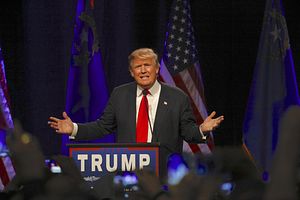Because his interview on foreign affairs with the editorial board of the Washington Post went so poorly last week, Donald Trump, the Republican Party’s front-runner for the 2016 presidential election, decided to give it another shot by speaking to the New York Time‘s David Sanger and Maggie Haberman. The results were unsurprisingly similar. Sanger and Haberman asked Trump several questions about the Asia-Pacific, forcing him to somewhat clarify his positions. I’ve written about Trump’s desire to “pivot” the United States away from the Asia and his comments to the New York Times on Friday suggest that his vision for Asia absent U.S. leadership goes far beyond mere retrenchment. (The transcript is a long read, but the bit I discuss here is toward the beginning–read it here.)
The interview opens with Haberman asking Trump about his previous complaints regarding the costs the United States foots for South Korea and Japan. She asks the right question; namely, in the absence of a U.S. forward presence in these countries, would a President Trump support Seoul and Tokyo acquiring a nuclear weapons capability of their own? Trump’s response comes down to “Sure, why not?” “Would I rather have North Korea have them with Japan sitting there having them also? You may very well be better off if that’s the case,” he says. “Biggest problem, to me, in the world, is nuclear, and proliferation,” he notes, however, just moments earlier. Trump doesn’t specify if he’d explicitly withdraw the U.S. nuclear umbrella, but given his broader thoughts on the value of the alliance and earlier statements he’s made about U.S. requirements to back Japan in an armed conflict, this is likely the case.
The ideas Trump is entertaining suggest that he would be ready to abandon decades of U.S.-led nonproliferation efforts. To increasingly worried observers of his campaign in South Korea and Japan, the comments will be worrisome. After all, though a debate on acquiring nuclear weapons exists in both countries, neither Seoul or Tokyo is close to political consensus on the issue. (Interestingly, in Japan, some in the Liberal Democratic Party eager to amend Japan’s post-war constitution and strengthen Tokyo’s offensive military capabilities might see the Trumpian view of the U.S.-Japan alliance as a point strengthening their arguments.) In any case, both countries would have to themselves abandon their existing nonproliferation commitments under the Nuclear Non-proliferation Treaty (NPT) and other regimes. Meanwhile, given existing uneasiness in Northeast Asia, the prospect of additional nuclear-armed neighbors in the region beyond North Korea would be anathema for Beijing. Trump’s readiness to pull back the nuclear umbrella, thus, would lead to a proliferation nightmare in East Asia.
In general, Trump’s statements on pulling back from U.S. alliances and encouraging these states that once benefited from a forward U.S. military posture to take on their own defense is not one that’s alien from specialist discourse on grand strategy. For instance, Barry Posen outlines a similar case in Restraint: A new Foundation for U.S. Grand Strategy, where he outlines a more modest exercise of U.S. power abroad. To varying degrees, other realist scholars have expressed similar ideas. Where Trump diverges from these informed commentators is his intention to not only pull back from alliances, but to actively encourage nuclear proliferation. Trump additionally sees no particular value in defending the post-Second World War liberal international order–an imperative that every U.S. president since Harry Truman has appreciated.
The Trumpian case for retrenchment, unlike more nuanced and informed takes, is fundamentally based in a false dichotomy. There is the status quo, which is seen as a maximalist over-extension of U.S. power, and the alternative, which is either getting Japan and South Korea to foot “100 percent” of the costs of the U.S. military presence on their soil or pulling back entirely. When the Washington Post‘s Fred Hiatt asked Trump if he thought the United States gained anything by having bases on Japanese and South Korean soil, Trump quickly responded, “Personally I don’t think so. I personally don’t think so.”
No doubt Trump will continue to make statements that will be deeply worrying for U.S. allies in Asia and elsewhere. Already, observers in Japan have expressed concern about his suggestions. Itsunori Onodera, a former Japanese defense minister, said that under Trump, “the United States would become isolated so I think there is great anxiety for allied countries.” For Japan and South Korea–two states that have their alliances with the United States as a linchpin of their security policies –the prospect of a Trump presidency grows more unnerving each day.

































